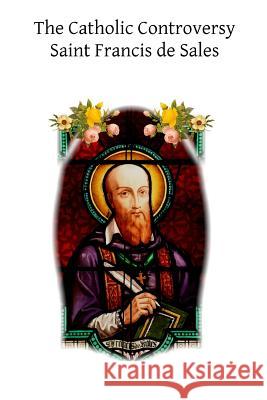The Catholic Controversy » książka
The Catholic Controversy
ISBN-13: 9781518610554 / Angielski / Miękka / 2015 / 432 str.
This is a photographic reprint of the original to insure faithfulness to the original. THE following Treatise is the message or teaching of S. Francis de Sales to the Calvinists of the Chablais, reluctantly written out because they would not go to hear him preach. The Saint neither published it nor named it. We have called it "The Catholic Controversy," partly to make our title correspond as nearly as possible with the title "Les Controverses," given by the French editor when the work was posthumously published, chiefly because its scope is to state and justify the Catholic doctrine as against Calvin and his fellow-heretics. It is the Catholic position, and the defence of Catholicism as such. At the same time it is incidentally the defence of Christianity, because his justification of Catholicism lies just in this that it alone is Christianity; and his argument turns entirely on the fundamental question of the exclusive authority of the Catholic Church, as the sole representative of Christianity and Christ. This is the real point at issue between the Church and the sects, and therefore he, as officer of the Church, begins by traversing the commission of those who teach against her. He shows at length, in Part I., that she alone has Mission, that she alone is sent to teach, and that thus their authority is void, and their teaching but the vain teaching of men. This teaching he tests in Part II. by the Rule of Faith. Assuming as common ground that the Word of God is the Rule of Faith, he shows that the socalled reformers have composed a false Scripture, and that they err also in rejecting Tradition or the unwritten Word of, God. And then, proceeding to the central point of his case, he shows that while the Word of God is the formal Rule of Faith, is the external standard by which faith is to be measured and adjusted, there is need of a judge who may explain, apply, and declare the meaning of the Word. That judge is the Holy Catholic Church. She is thus the necessary exponent of the Rule of right-believing, and each of the voices by which she utters her decision becomes also a part of the Rule of Faith, viz., her own general body, Councils, Fathers, and her supreme Head and mouthpiece, the Pope, the successor of S. Peter and Vicar of Christ. Miracles and harmony of doctrines may be considered the complement of the Rule of Faith. In all these matters the Saint proves conclusively that the Catholic Church alone fulfils the necessary conditions. In Part III. he comes to the doctrines of the Church in detail, but of this Part there only remain to us three chapters on the Sacraments and an Essay on Purgatory. This may suffice as to the aim and subject-matter of the Treatise. Of its intrinsic merits the author's name is sufficient guarantee, but we add more direct testimony because it is a new revelation of the Saint.
Zawartość książki może nie spełniać oczekiwań – reklamacje nie obejmują treści, która mogła nie być redakcyjnie ani merytorycznie opracowana.











